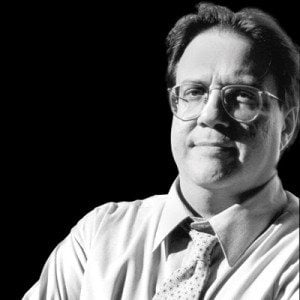Remembering Claude Stanush
A Texas literary giant and mentor.

It was a late, sweaty summer night in San Antonio, it must have been 1980 or 1981, and we were up on Maverick Hill for a house party, cool beverages, laughs and lots of mad conversation.
And I have this memory of the wise, generous Claude Stanush looking at the swirl of very young journalists who had invaded his place. All of us were in our early, ambitious 20s—practicing our irony, yakking about all the things that we thought we knew about the world.
I seem to remember these people being in attendance: One guy who years later would be a globetrotting National Public Radio correspondent. Someone else who would become the chief for the Reuters bureau in Havana. Someone who would become one of the best writers in the history of The Wall Street Journal. A young man emerging as the best political cartoonist in Texas. I was a newspaper hack dreaming of writing books.
And there was Claude, a national treasure, a truly humble genius, off to one side and soaking up everything rising from the cackling menagerie of greenhorns.
He had such a beautiful, knowing smile on his face.
It was as if only someone as mindful as Claude could see the possibilities, which would be about right. And it was, too, as if he was nurturing those possibilities. Which would also be about right.
He was so giving – and if you met him, you could instantly sense that he had a powerful calm, an almost holy and humble glow about him. He exuded tolerance and a genuine, patient curiosity.
Claude passed away in his sleep Saturday in San Antonio at the age of 92.
He was a brilliant essayist, journalist, author, screenwriter – and his writing was so brilliant because he was so thoughtful. Maybe most of all, he was a role model for how to both write about and live a life of deep contemplation and humanity.
After he graduated from Central Catholic High School and then St. Mary’s University in San Antonio, he spent a life of enlightened inquiry. In a way, I suspect, he voluntarily stayed in school the rest of his life. He wanted to keep exploring, to keep hearing people’s stories. Late in life he was still devouring the classics, the cornerstones of philosophy and faith, and exploring the meaning of existence.
And so when he sat down to write his journalism, his columns, his books they were so many things: Intelligent, probing, humorous, bittersweet, aching and even filled with a sense of wonder and magic.
A fine obituary in the San Antonio Express-News spells out his career. Claude was a star correspondent for LIFE, doing exquisite stories about spirituality and faith, among many profundities. He wrote a column for The San Antonio Express-News that often touched on ethics—and that was so deep, so good, it almost seemed like an anomaly in a daily newspaper. His work inspired movies (“The Lusty Men” and “The Newton Boys”). He created timeless books: “Sometimes It’s New York,” is one of the finest collection of short stories ever birthed by a Texas writer. He also wrote “The World In My Head,” “The Balanced Rock and Other Stories,” “The Newton Boys: Portrait of an Outlaw Gang.” Too, he and his extraordinarily gifted (and equally generous) daughter Michele Stanush co-authored “All Honest Men: A Biographical Novel.” He was, as well, honored with a National Endowment for the Arts award, a J. Frank Dobie award, and one of the first Dobie Paisano Fellowships.
Given all that, he had a humility that was as deep as his intellect. Pretension and bitterness were not words you would associate with Claude. He was so much smarter than that—he had lived such a life of intellectual and spiritual rigor that I think he simply transcended petty things like jealousy.
He gave Texas—the world—many gifts. And among my favorites was this sense of awe, genuine delight, that he exuded well into his later years. He possessed what can only best be called a joyous dignity.
That truly knowing smile.
Thomas Merton said something that fits Claude very well: “If a man is to live, he must be all alive, body, soul, mind, heart, spirit.”
And, Merton also said, “once you have grace, you are free.”
My sense of Claude was that knowing smile—the one I first really saw on a hot summer night a few decades ago—came from being so free, from having so much grace, from being so alive.


